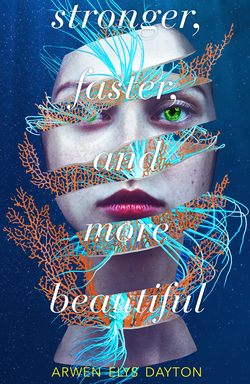Читать книгу Stronger, Faster, and More Beautiful - - Страница 15
5. MIRACLE
ОглавлениеSo, yeah. That happened.
And then the next day at school, everyone knew. Gabriel must have started telling people immediately, maybe even on his way home that night. He had told them everything—but mostly about the strange new contents of my body.
Kevin Lopez smirking in the hall, Matthew Nowiki doing the robot with extra hip thrusts thrown in, Kahil Neelam making that hand gesture that told the story of my robotic vagina eating Gabriel’s penis, over and over, because obviously that’s what robot vaginas would be designed to do.
It wasn’t like I could yell back, I don’t have a robotic vagina, okay? That part of me is still real! I don’t think that would have helped.
After I threw my soup in Gabriel’s face and yelled at him so loudly my voice echoed off the Hollywood Hills, I ran out of the courtyard. Behind me I heard hoots and high fives, and girls giggling, and Kahil going on and on with the robot jokes. My meltdown was the most exciting thing to happen at St. Anne’s in at least a year. I like to think someone back there stood up for me. Maybe Lilly came to my defense, though maybe not. She was upset that I hadn’t told her about the sex. Or the injuries. She felt left out, and it was true, I’d left her out.
The headmaster, Mr. Kinross, found me by the back fire stairs, sitting in the shadows and not crying. My eyes stung, the meshline was pulsing with my shame, and that was all the relief I could hope for. He took me to his office, where he offered me a large bowl of wrapped toffees. I immediately stuffed two into my mouth and was surprised at how much they helped.
Mr. Kinross was fairly young, in his midforties maybe, Irish with black hair and blue eyes. There was even a hint of an accent still in his voice, kind of retro, because he’d come to the US when he was a teenager. It was as though the board of St. Anne’s had found him through a casting call. He was nice.
He let me eat my toffees in silence for a few moments, and then he said, “Ludmilla”—he was one of only a few people who insisted on calling me by my full name—“your parents told me about the extent of your injuries, when you came back to us. It’s not my place to discuss them with anyone else, of course, but I do have some idea what you went through. You sitting here is a miracle. I want you to know that we treasure miracles at St. Anne’s.”
Through the side windows bracketing his door, I watched students passing by in the hall. A few glanced in at me but turned away quickly when they realized there was a chance I might make eye contact.
“It’s like they think I’m a heretic,” I said.
It was such an old-fashioned word, but it felt right. Mr. Kinross thoughtfully unwrapped a toffee and put it in his mouth.
“There’s nothing so medieval as high school,” he muttered.
“I didn’t want to tell people because I thought they would feel sorry for me. Or secretly think I was unnatural. I didn’t think they would, you know, decide that I was a disgusting joke.”
My voice broke and I looked down, trying to blink away the burning in my eyes.
“Something ugly is happening to our world,” he said. “If God gave us minds, should we not embrace the fruits of those minds? Surely it is a mercy, and a beautiful calling, to minister to the injured and the ill?” This didn’t sound as formal as it might have, because it was said while sucking at a piece of toffee that kept clicking against his teeth. His kind eyes studied me—sad, seething, half-artificial me. “And yet, I see families with an entirely different view. They have taken it upon themselves to decide what God allows—which is surely exactly what they accuse the doctors of doing.”
It was a relief to hear an adult—a religious adult—say what I was thinking. Even so, I kind of wanted to get out of there, because he’d probably heard about the sex too, and I guessed I would be in for a lecture about the evils of premarital intercourse if I lingered in his office too long. The prickle of a nonblush was coming over me.
But all Mr. Kinross said was “I will have a chat with the boys.” He must have seen the worry in my face, because he quickly added, “I won’t let them make it worse for you, Ludmilla. There are some advantages to running a religious school. I can call on the fear of God when it’s warranted.” He smiled. “Think of your namesake, St. Ludmilla,” he said gently, when he saw my lingering doubt. “She faced opposition at every hand and yet she held to her faith.”
I muttered, “Did she? Or is she a saint only because she died?” And then I asked him the question that had been haunting me all year. “And was … was I supposed to die?”
“Ah. Do you think you were meant to be St. Ludmilla of Los Angeles?”
“I could never be a saint,” I said, “but I do wonder if I’m supposed to be here at all.”
“Perish that thought, Ludmilla,” he told me with a gentle certainty that was as soothing to my ears as the toffee was to my stomach. “You are being tried. Do you know that it’s often much harder to stay alive? You’ve chosen the thornier path. I admire you for that.”
Even if this sounded like a speech he’d lifted from a 1950s film, it made me feel better.
